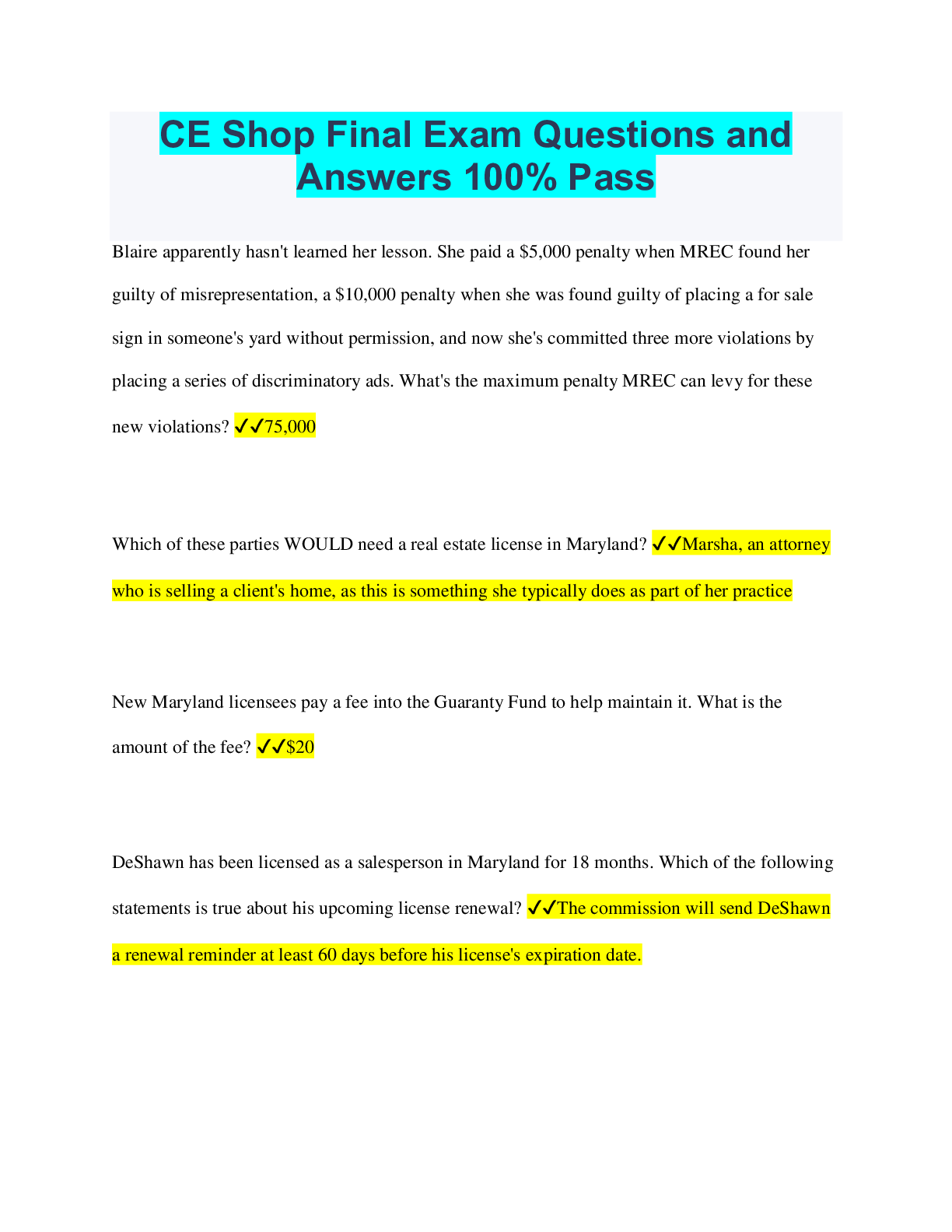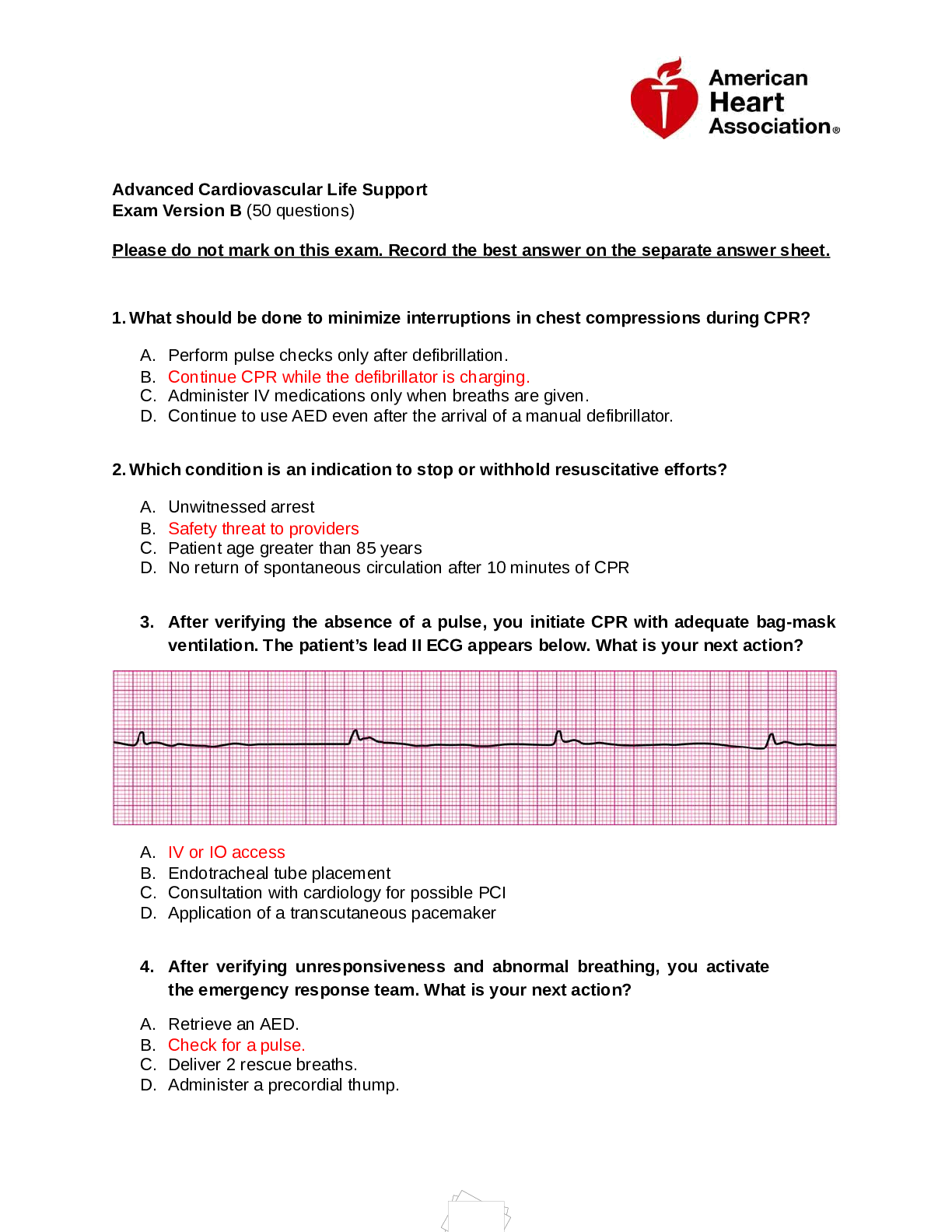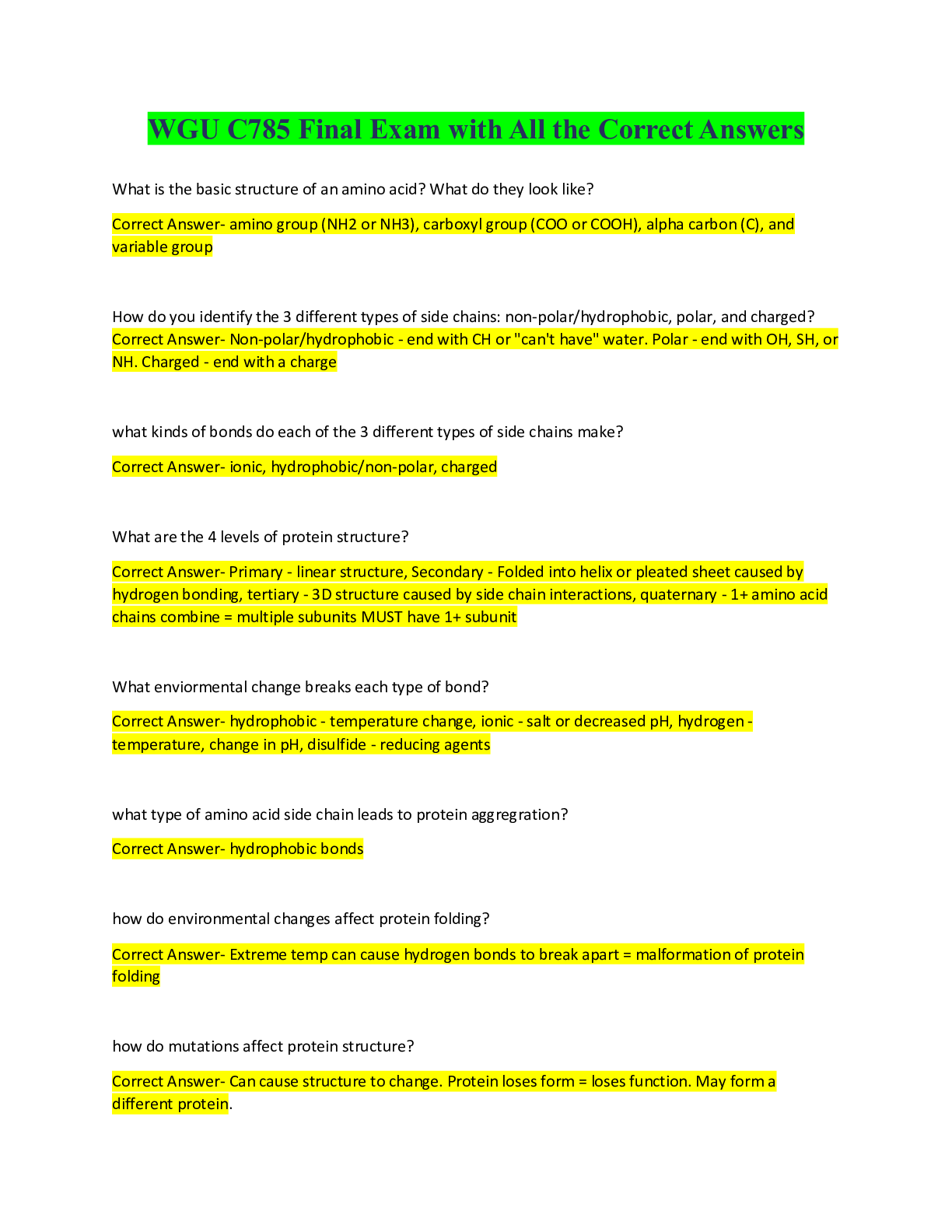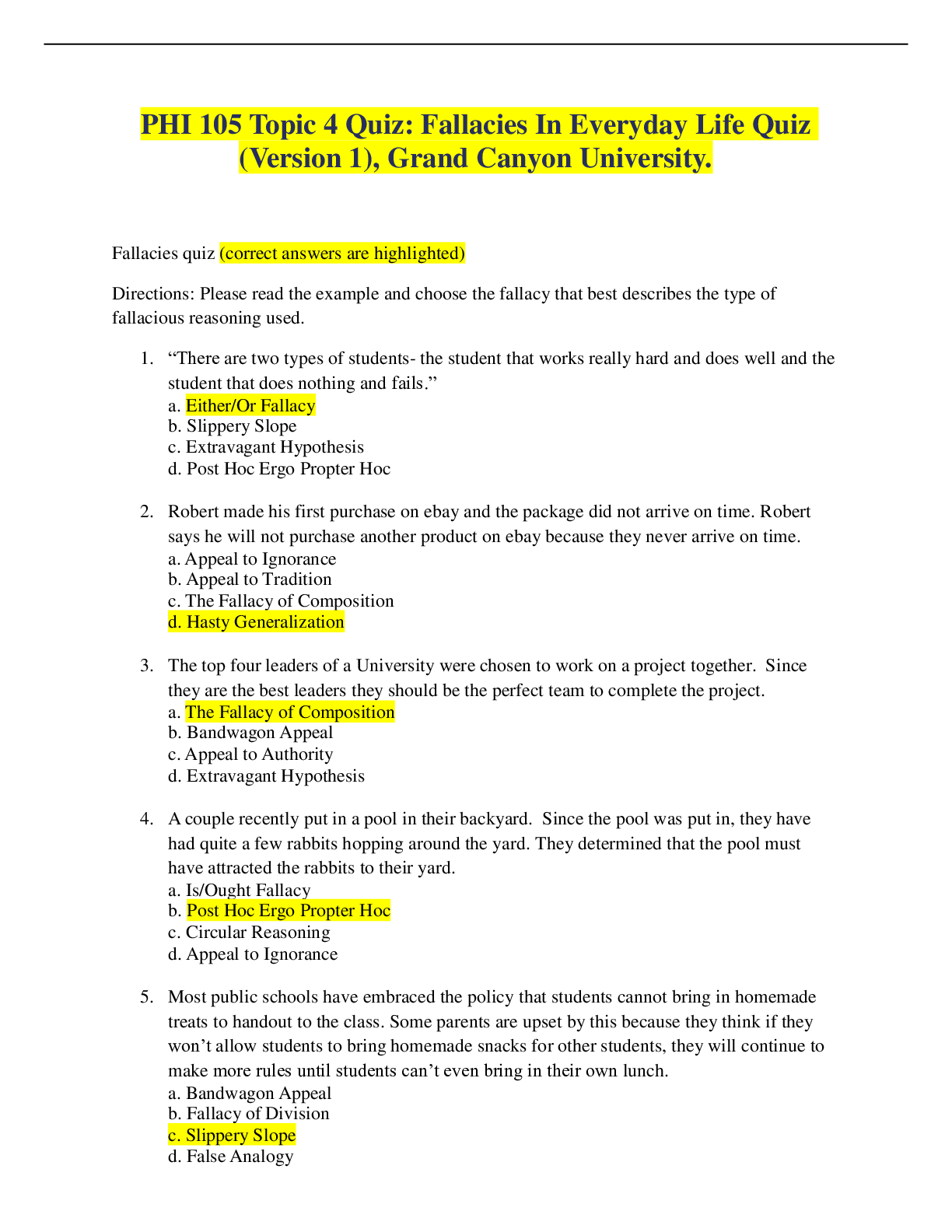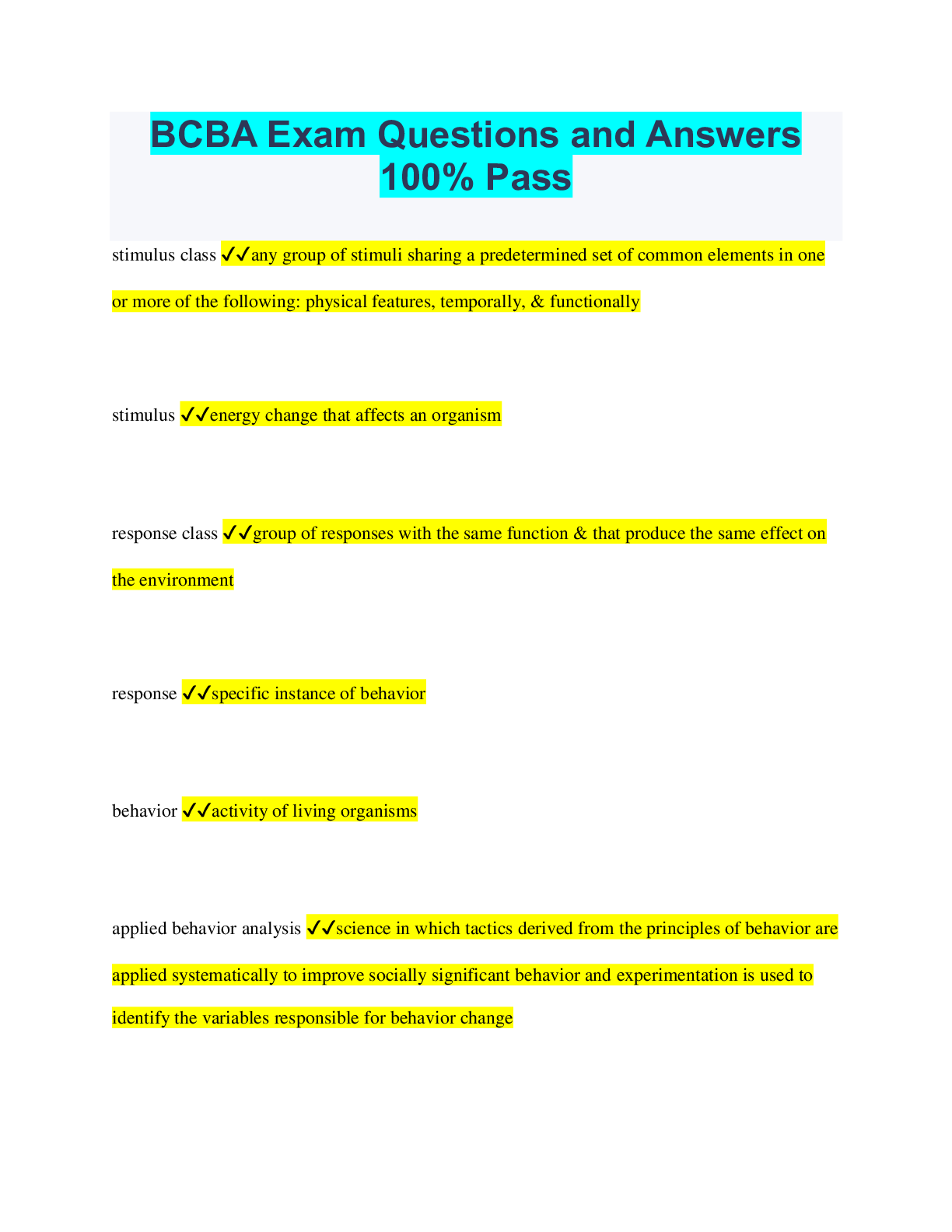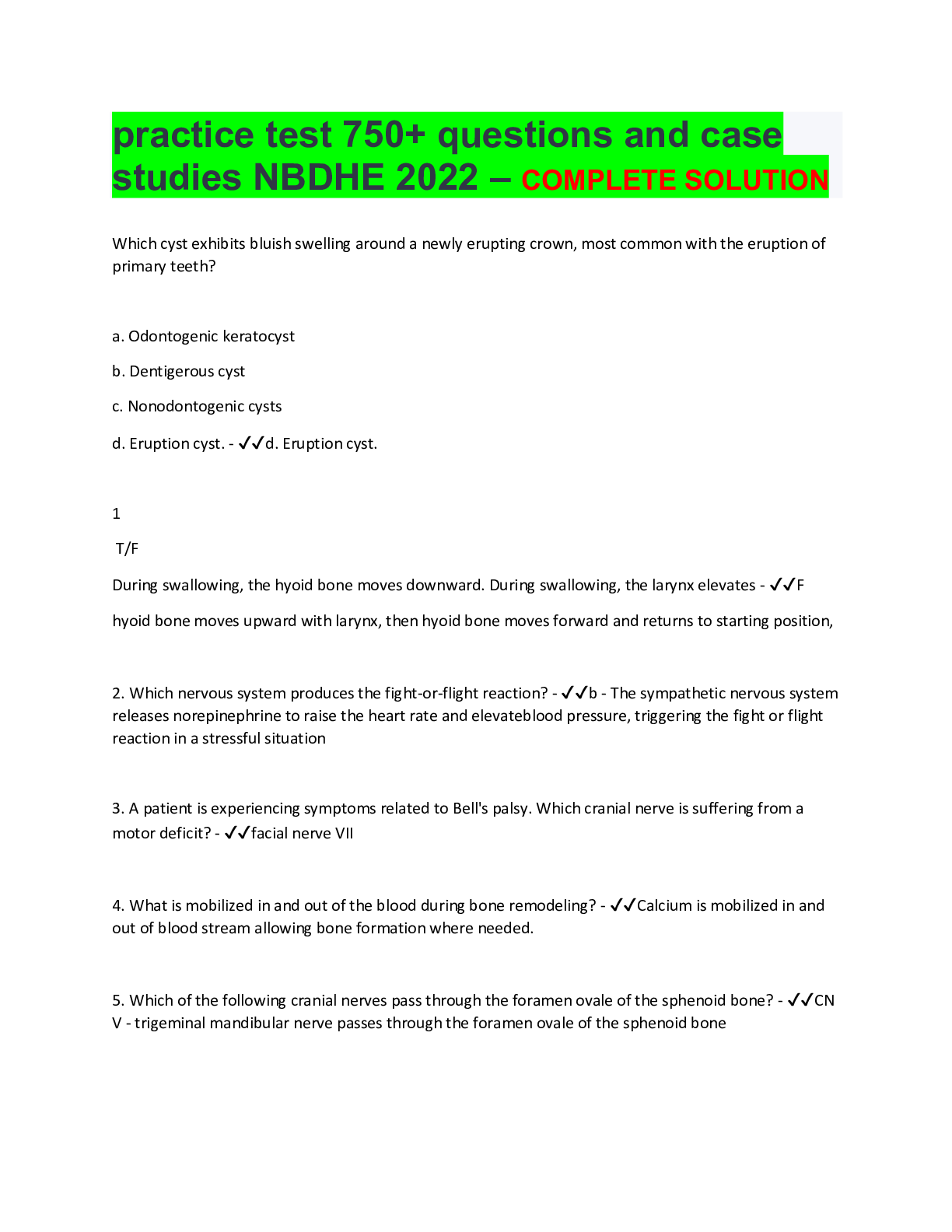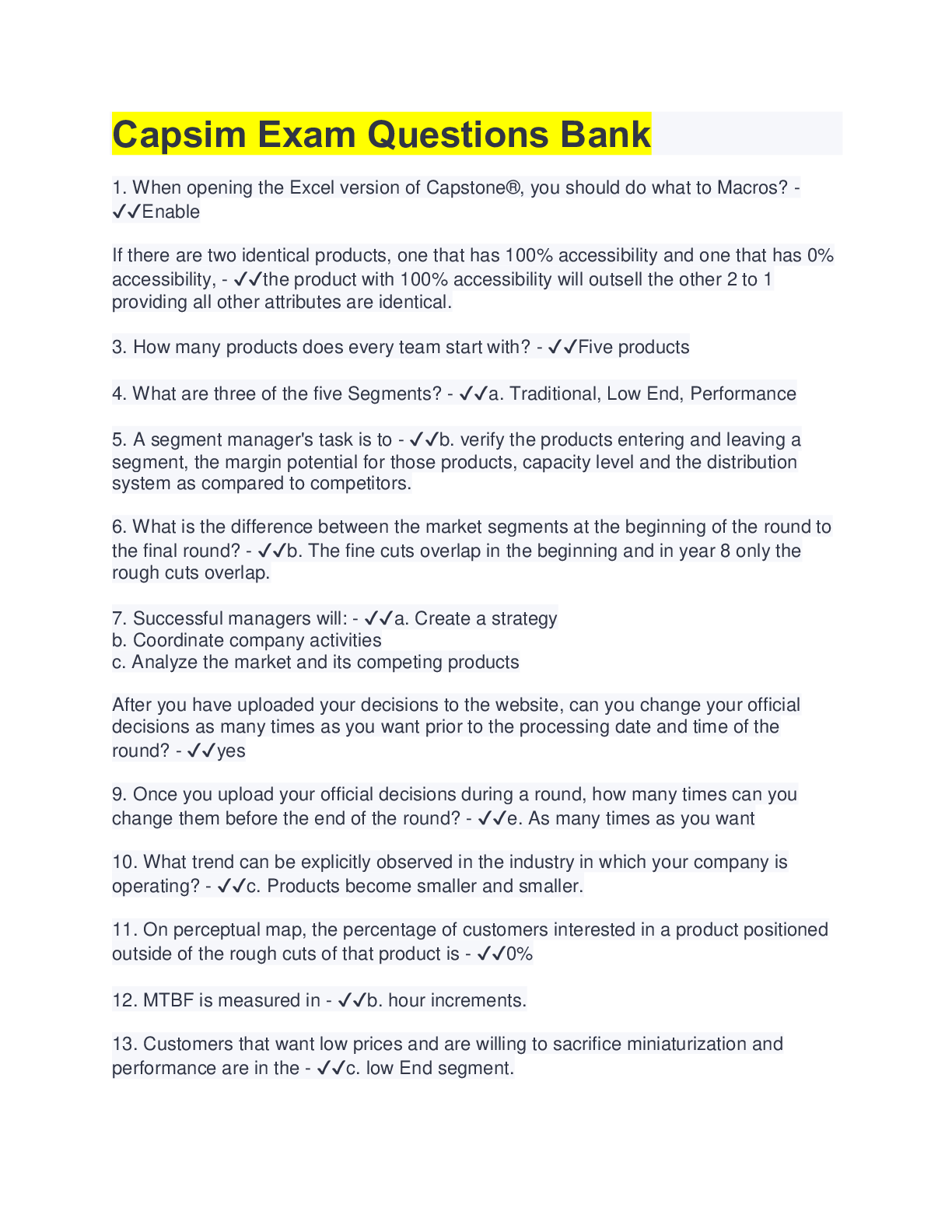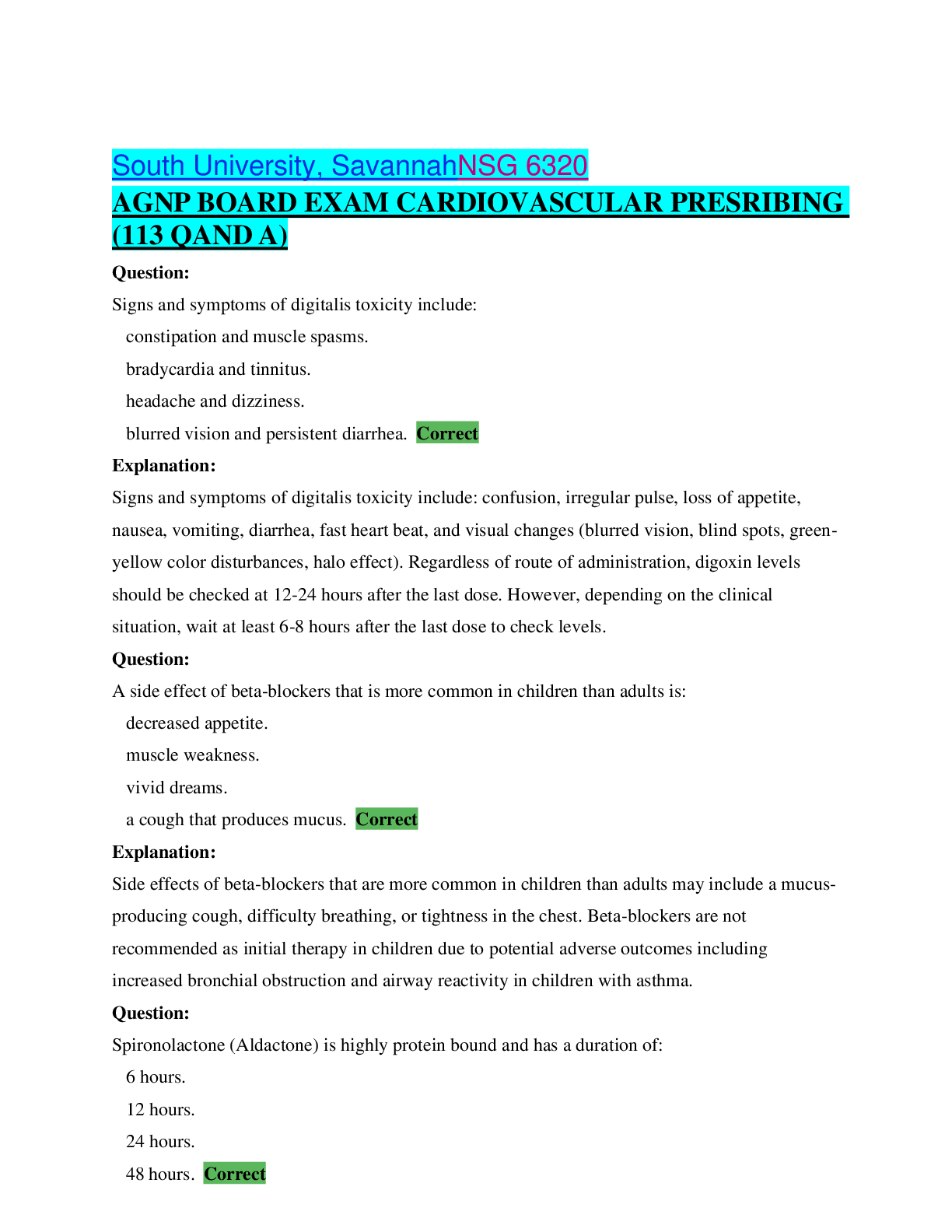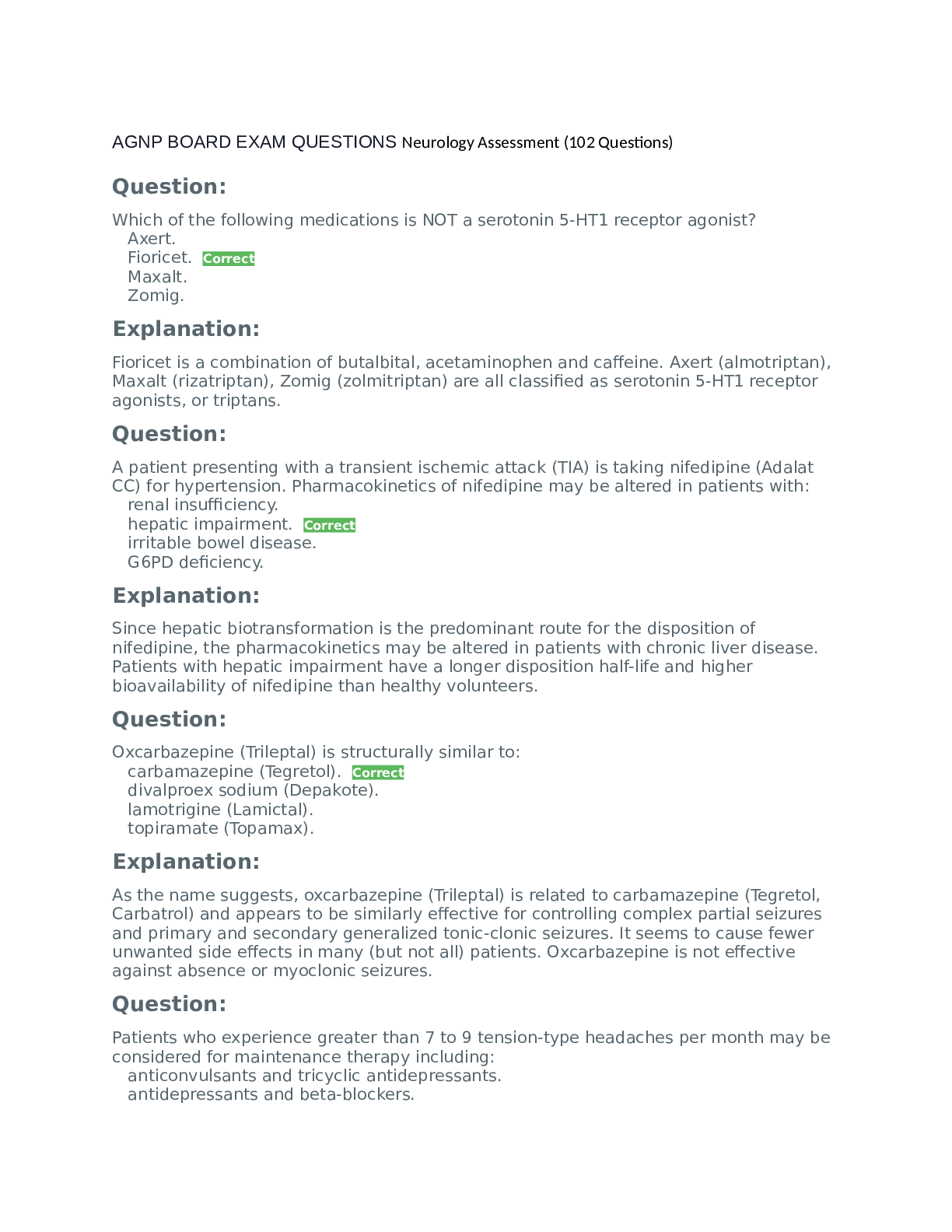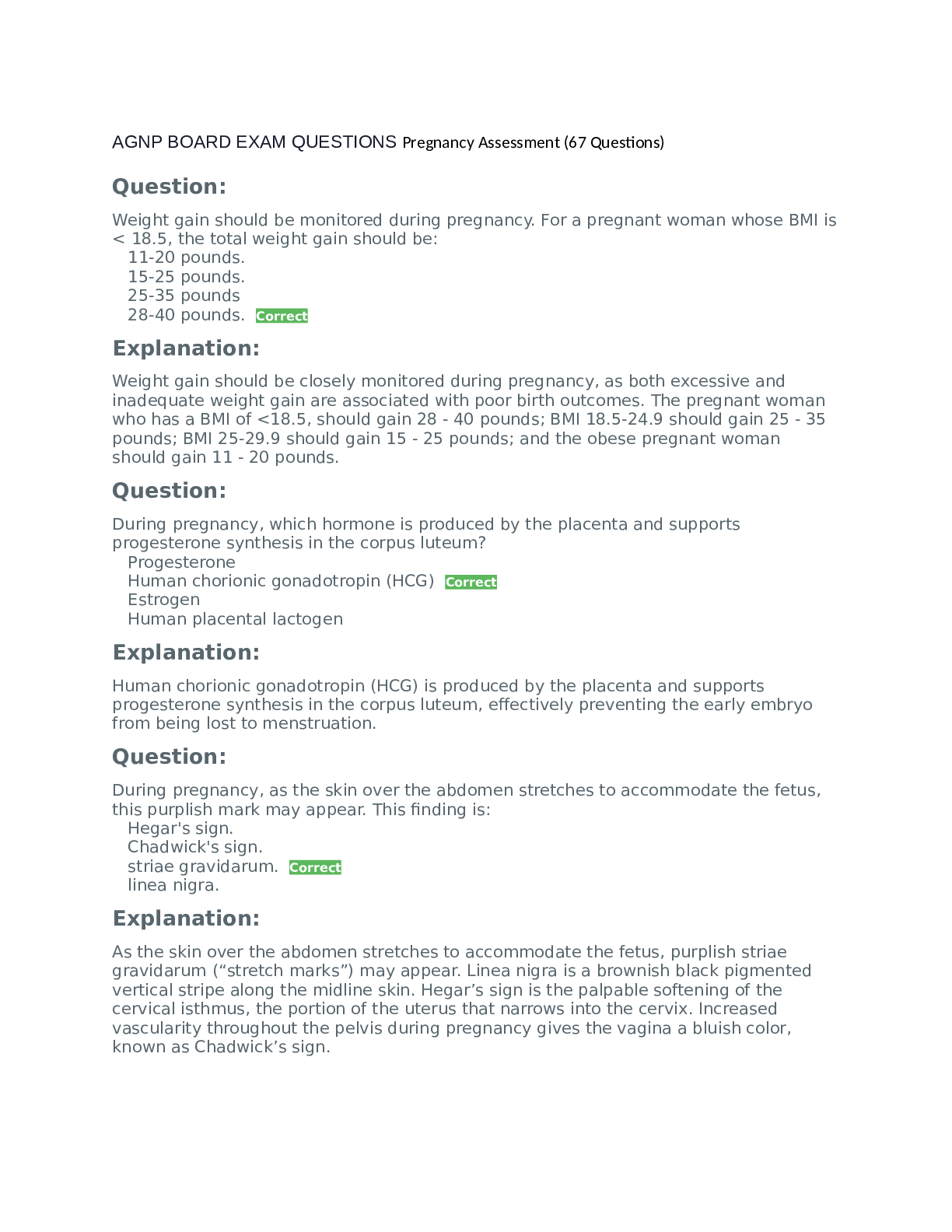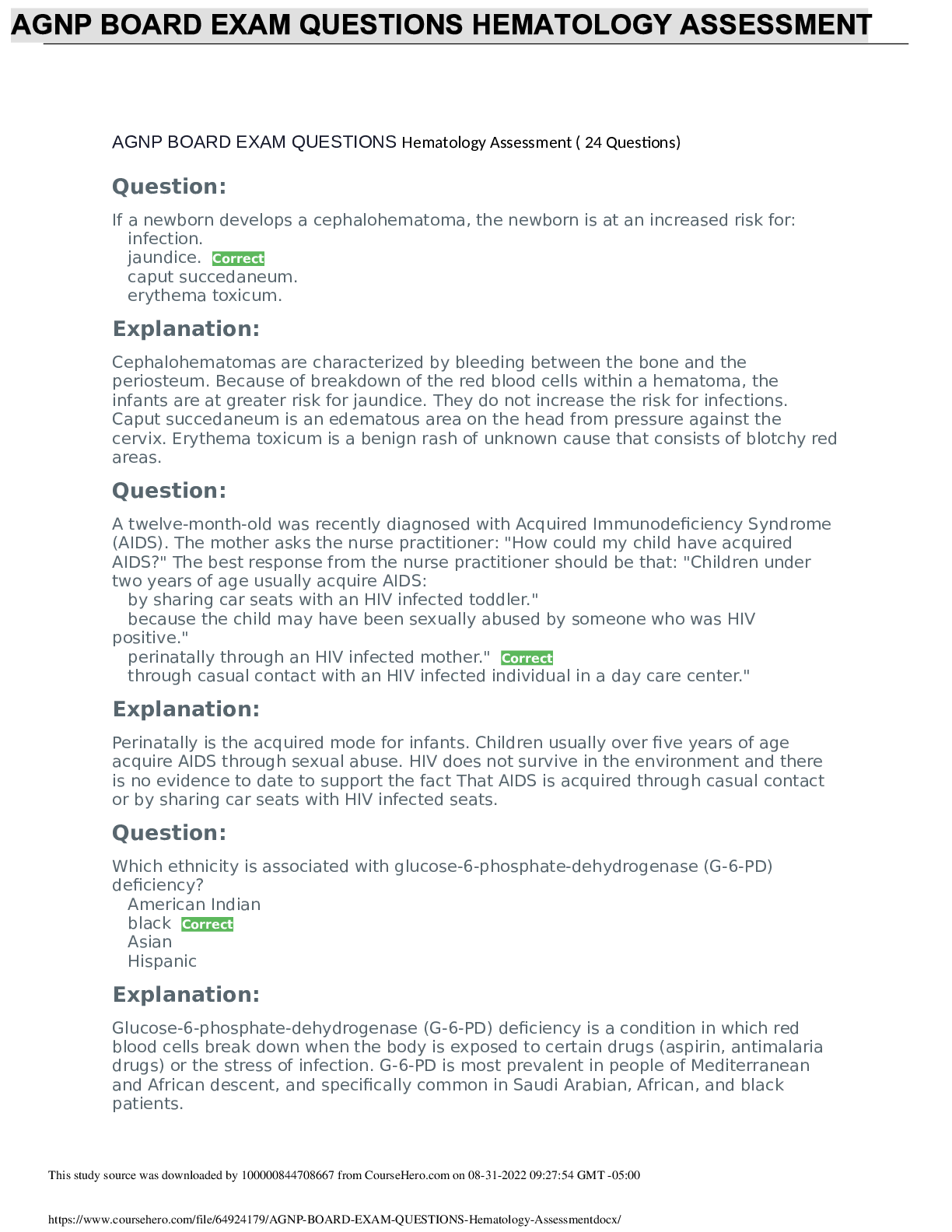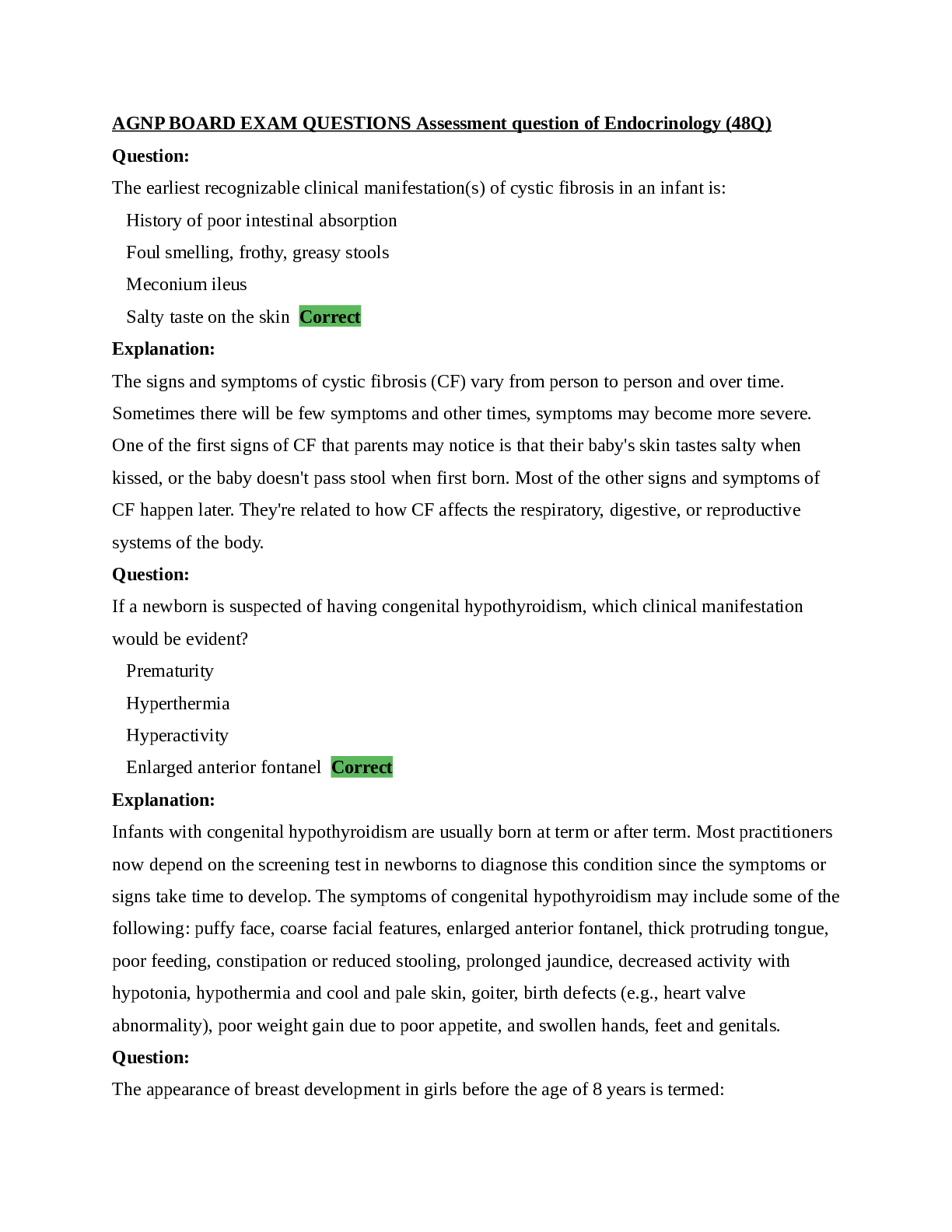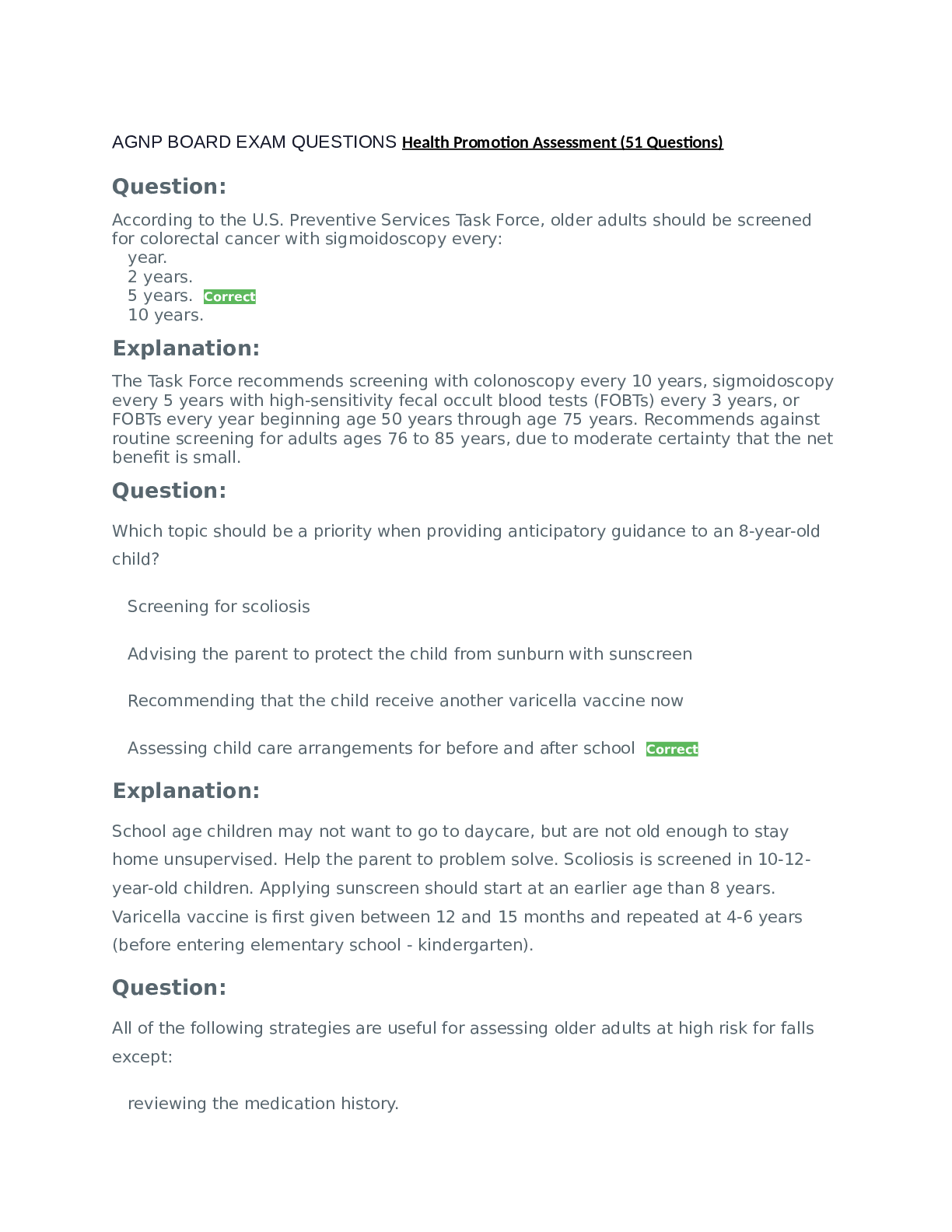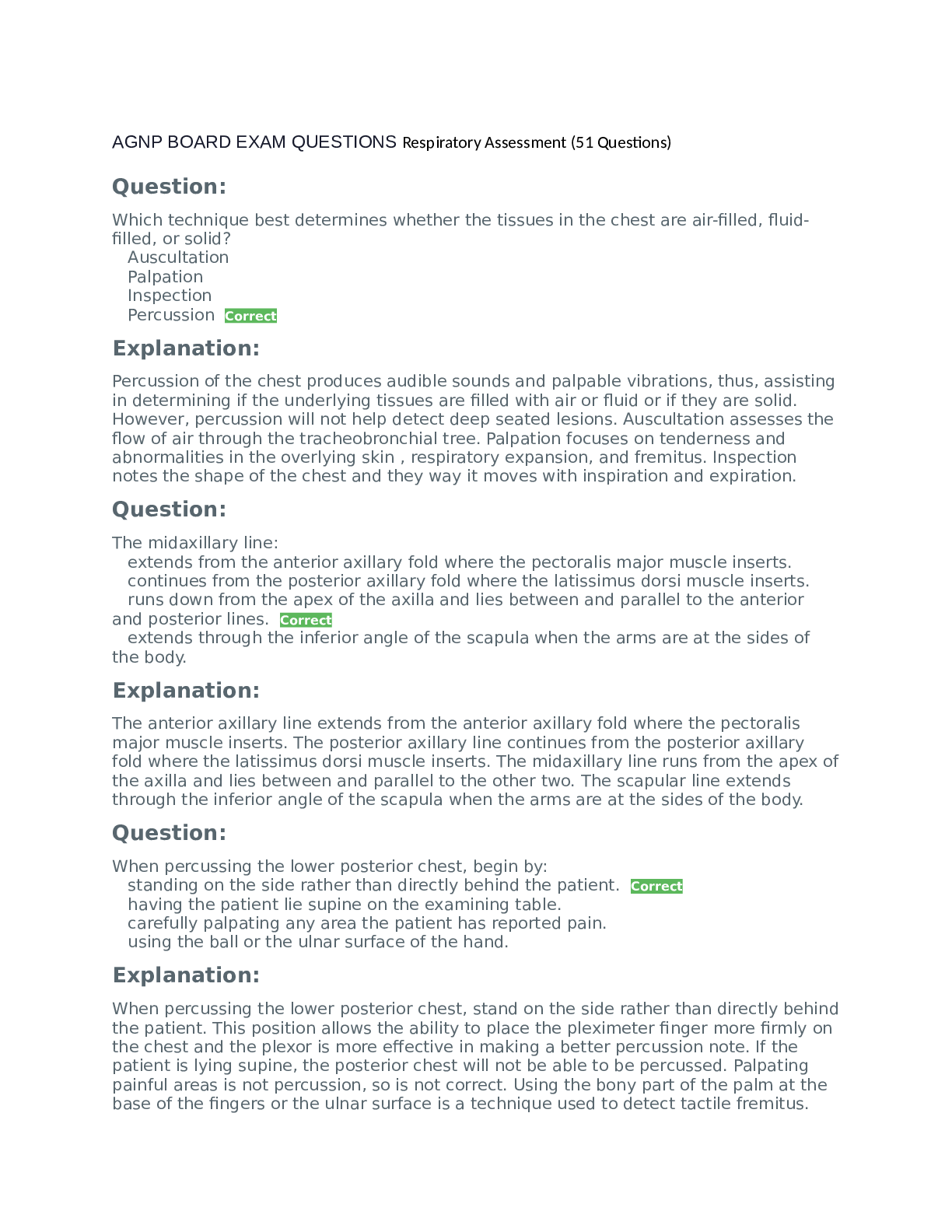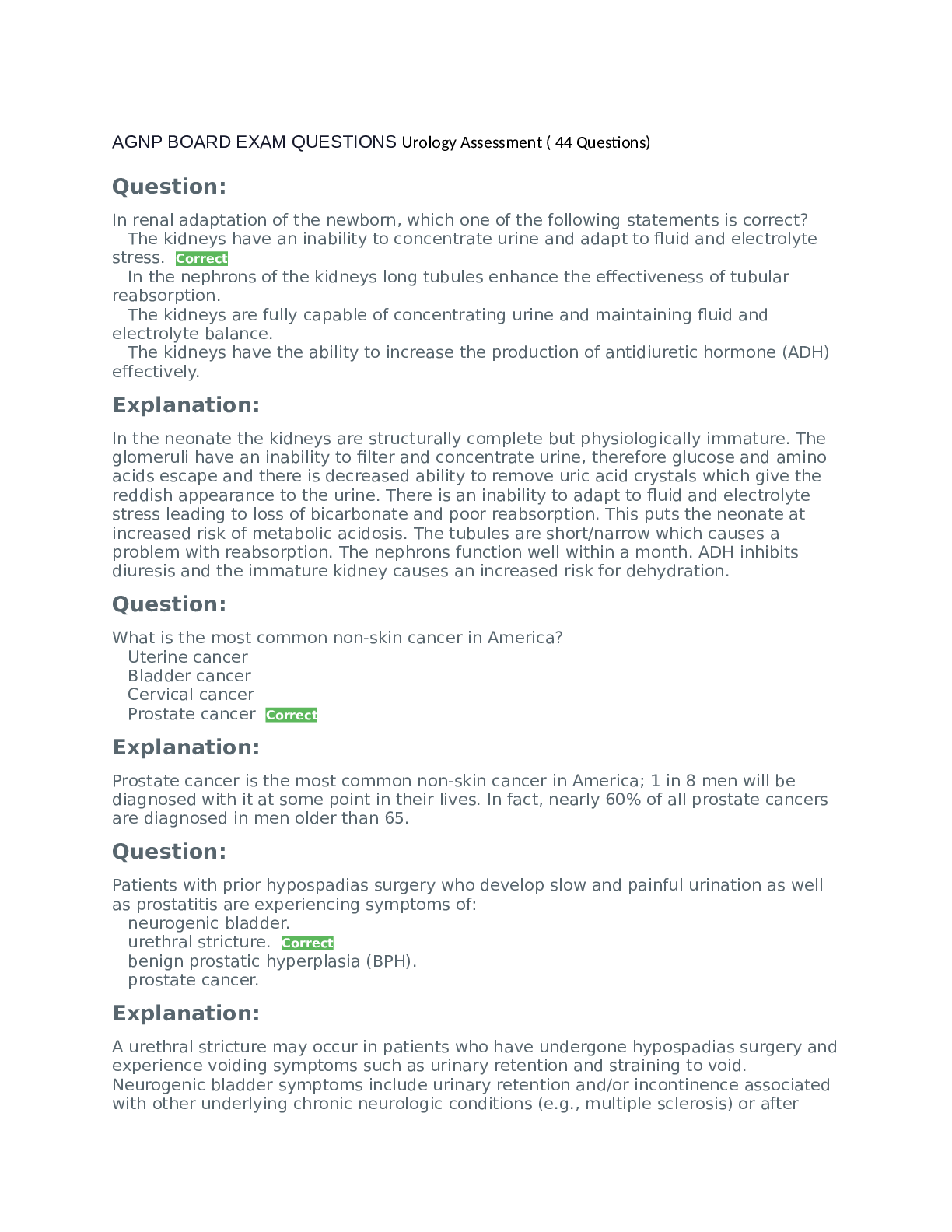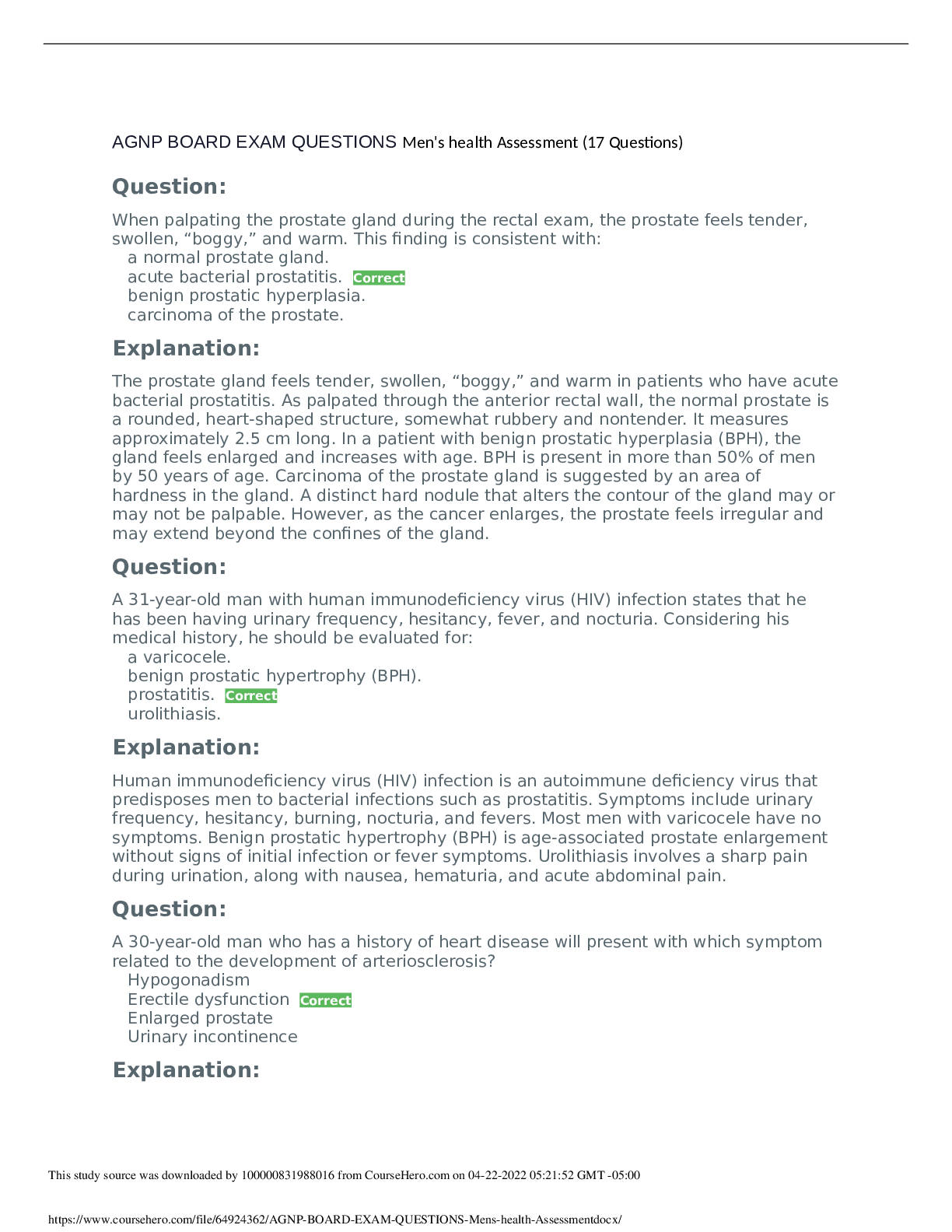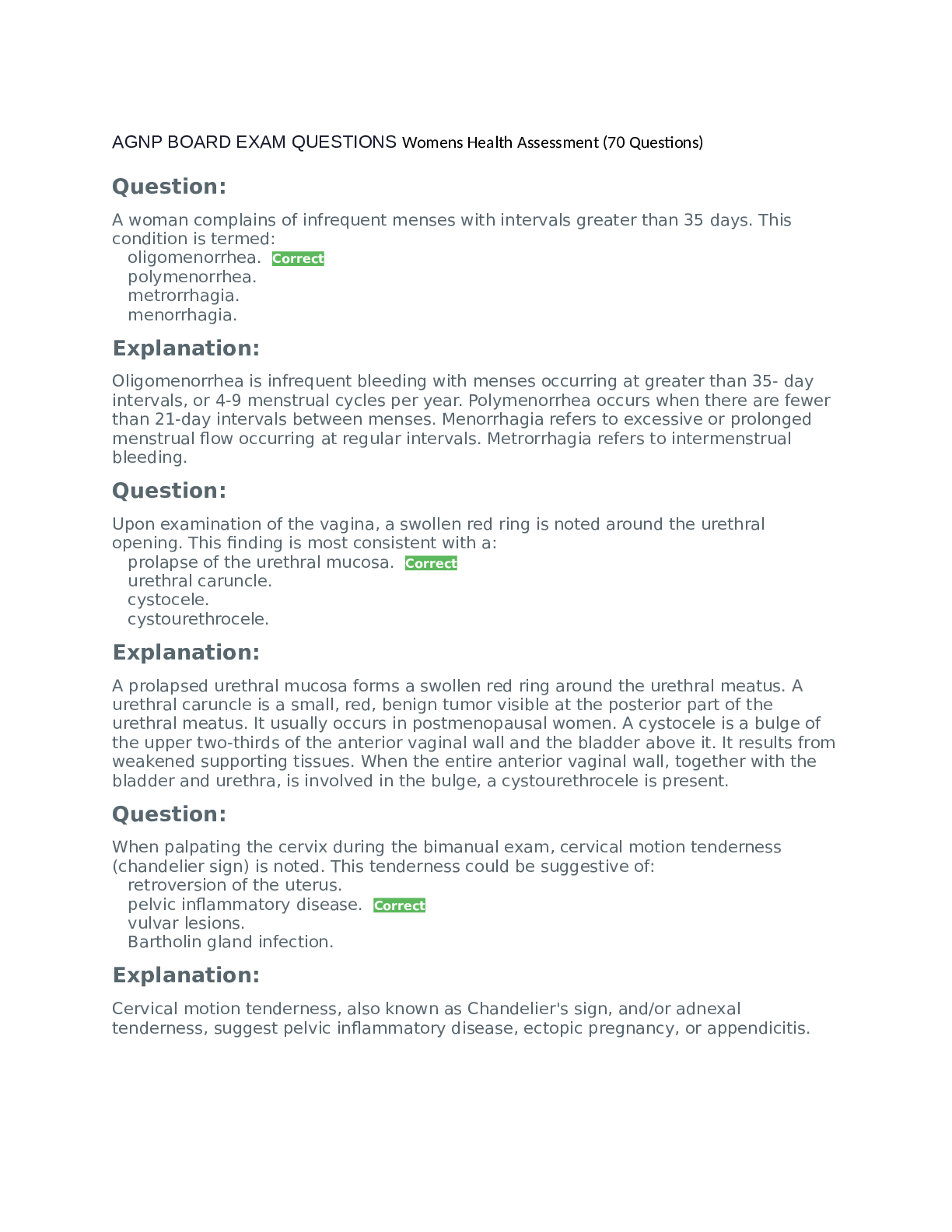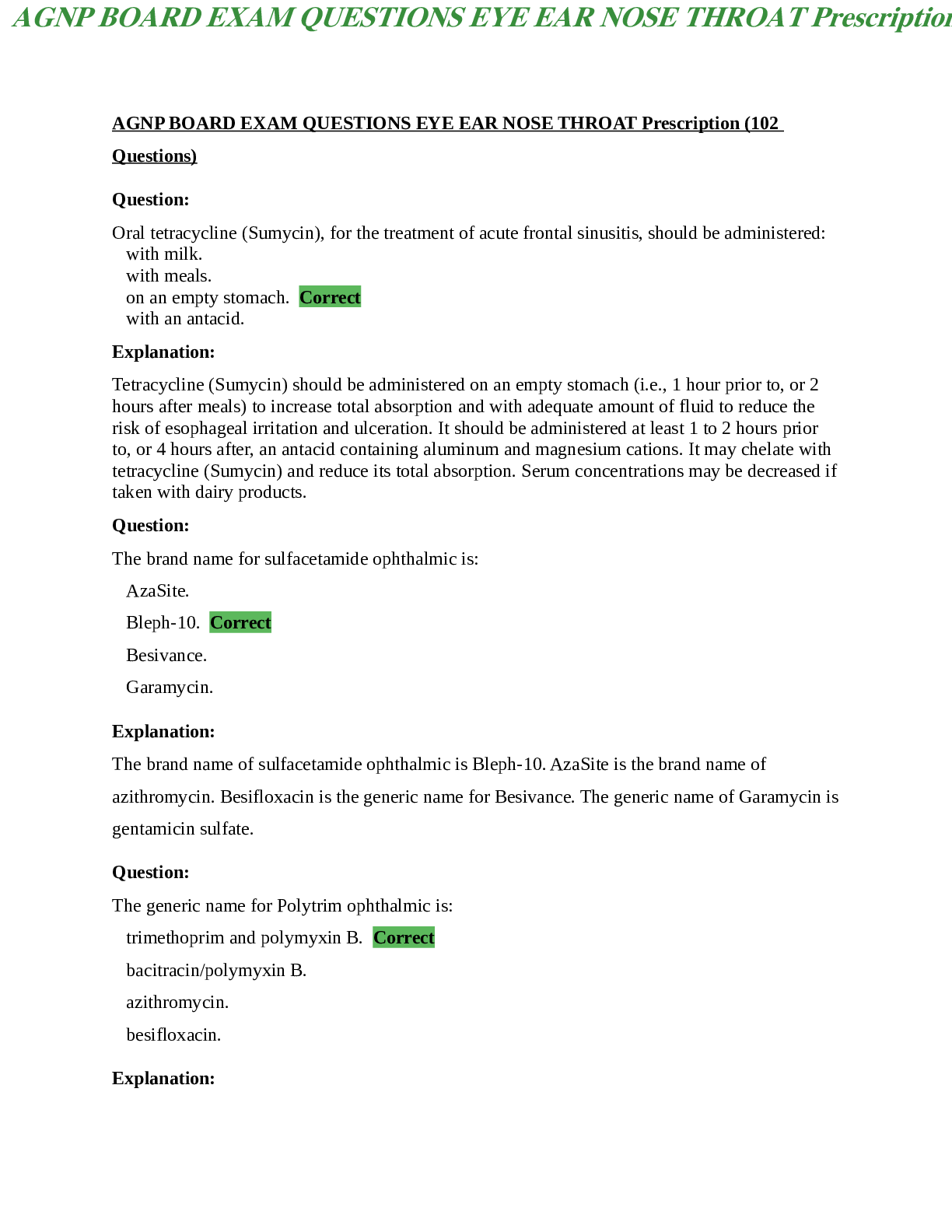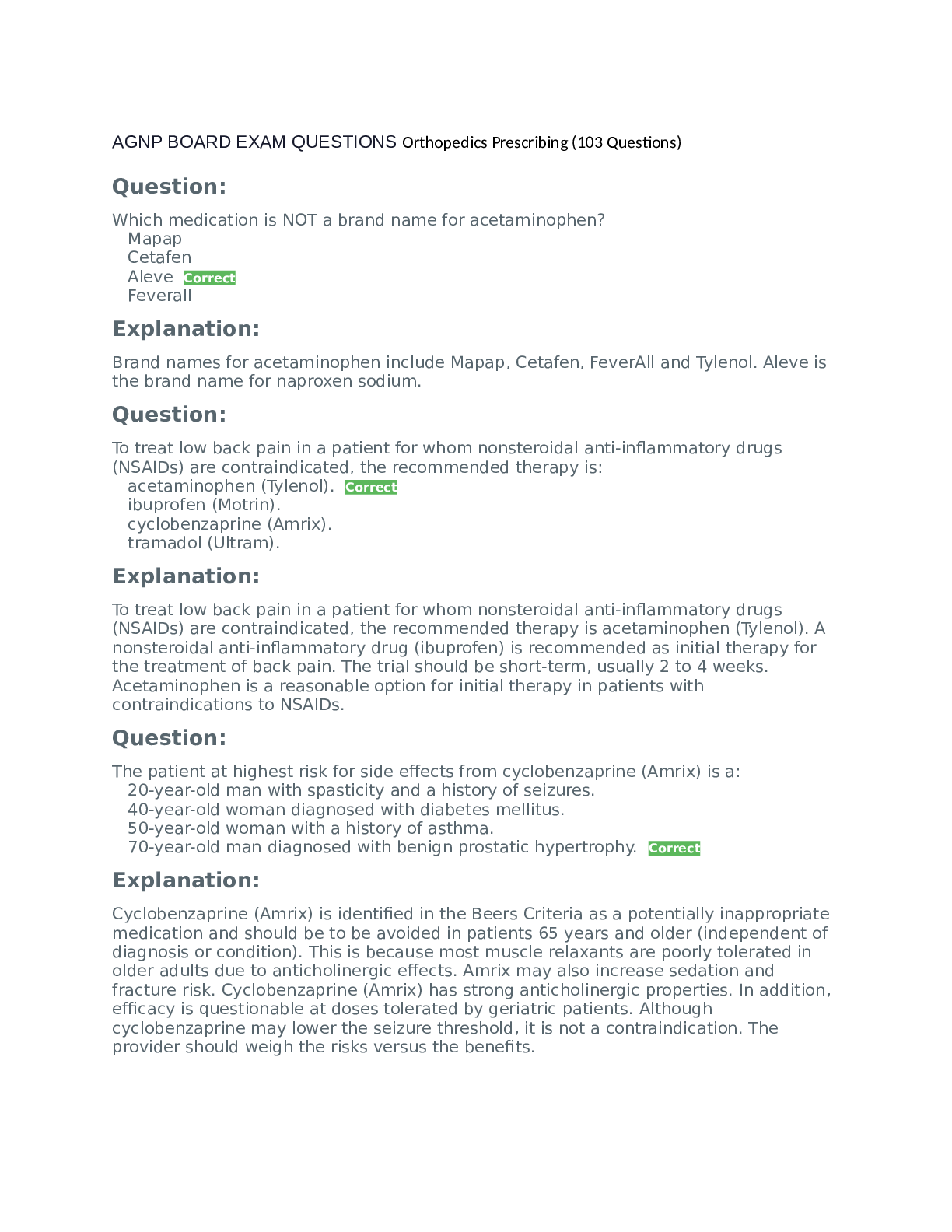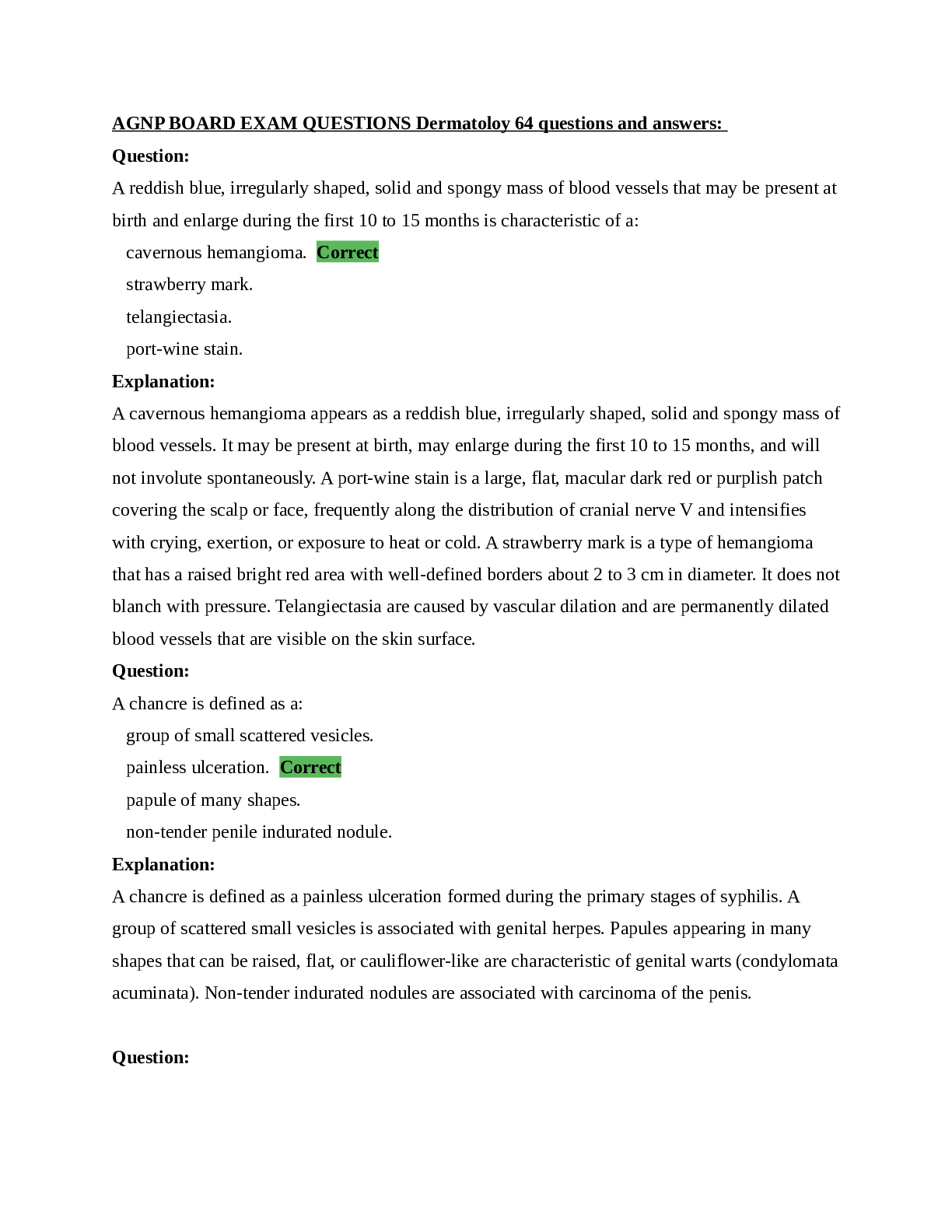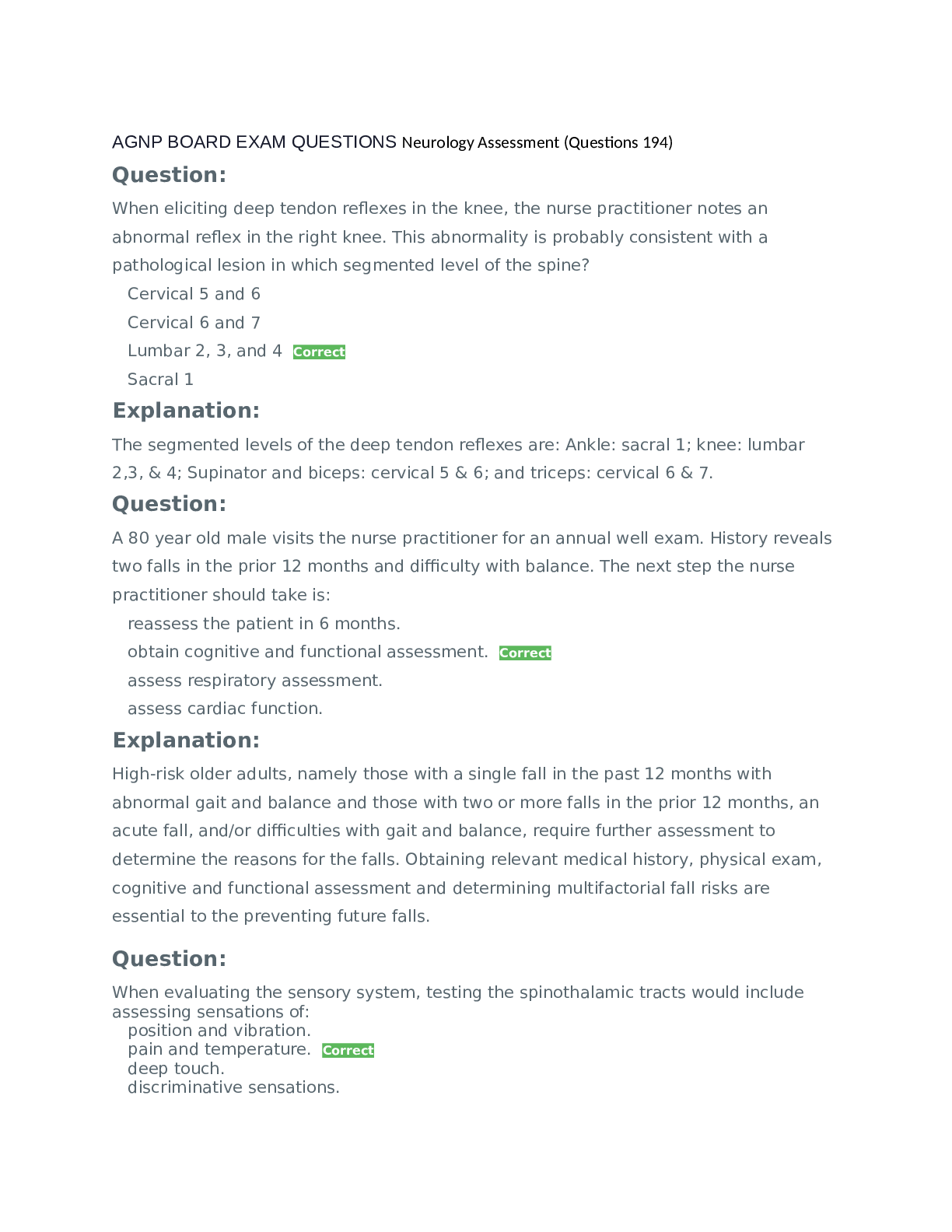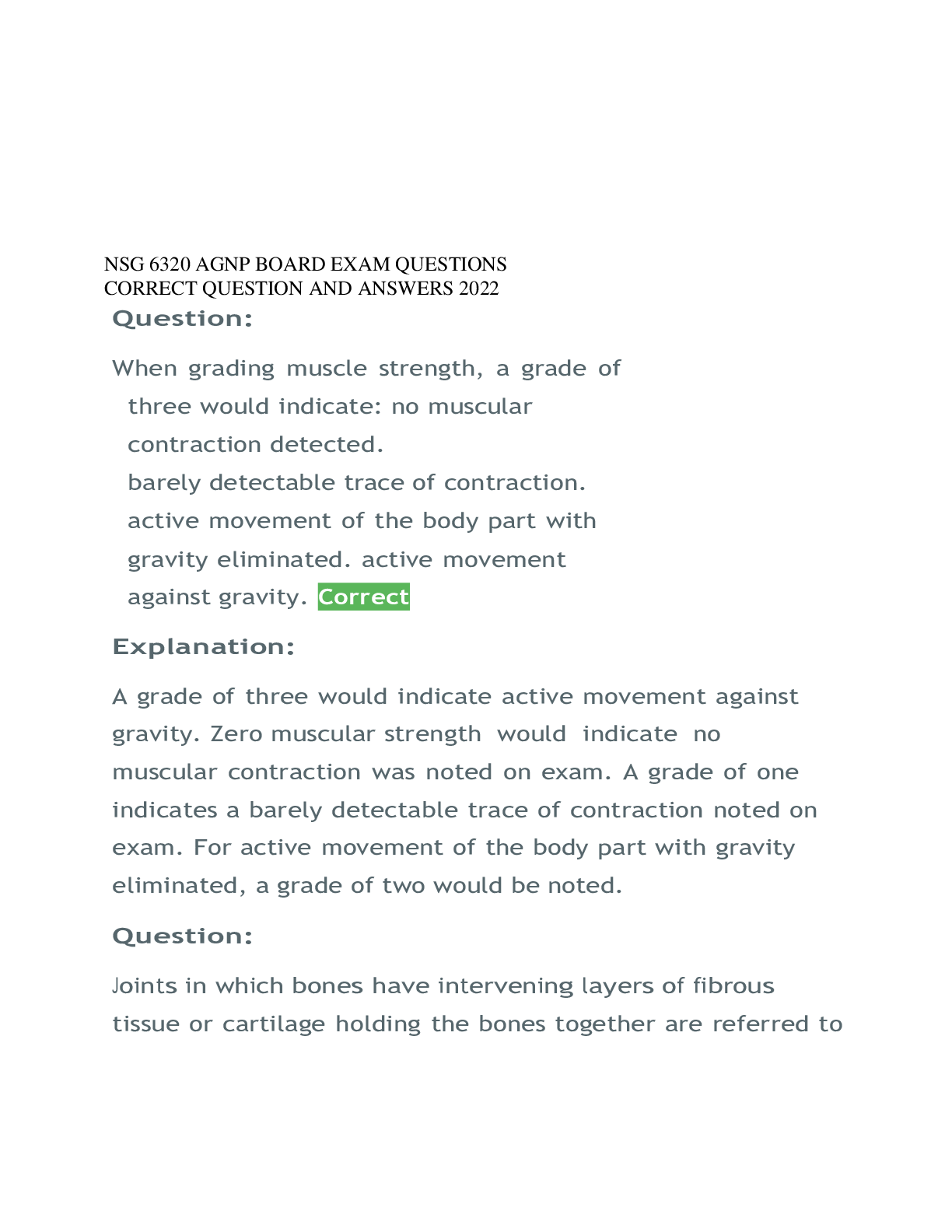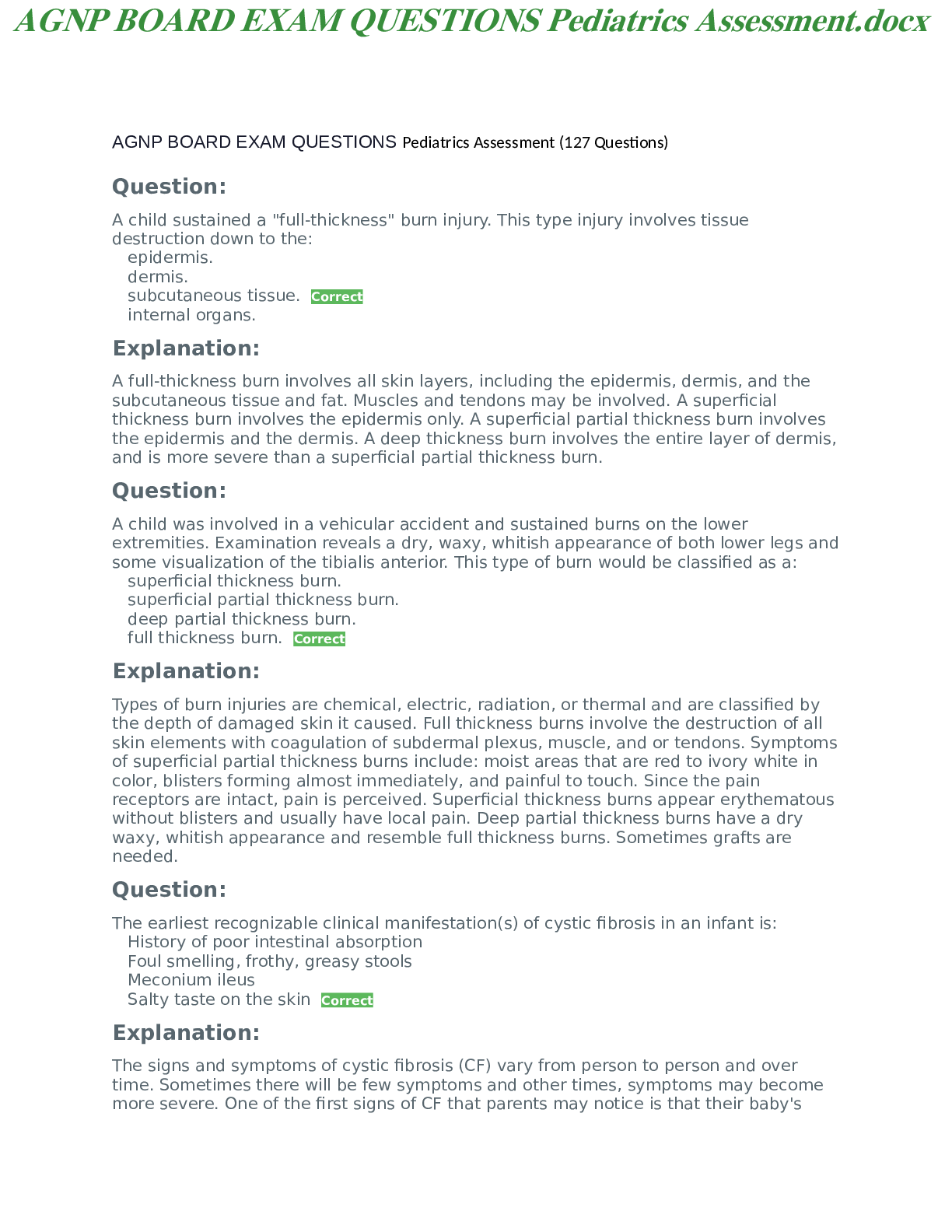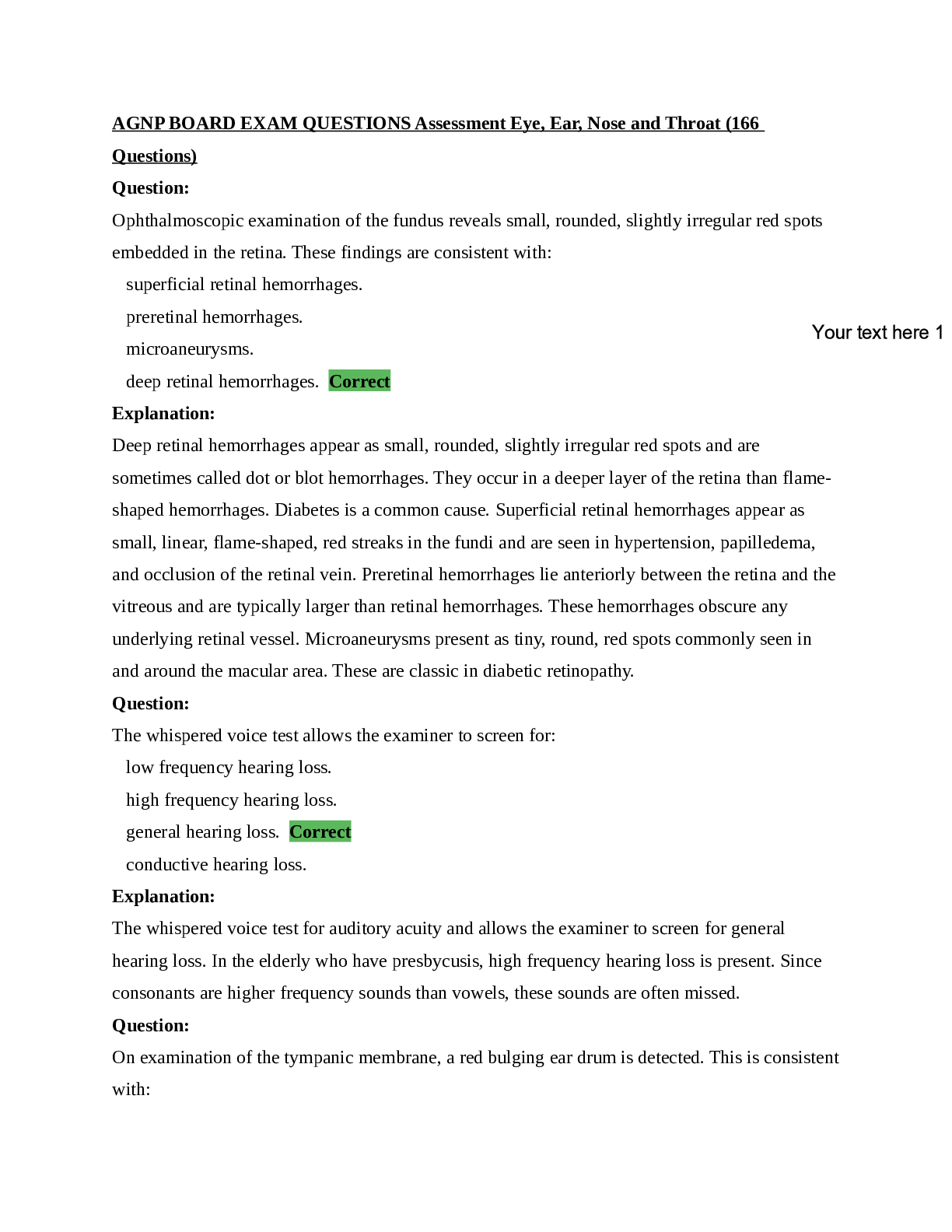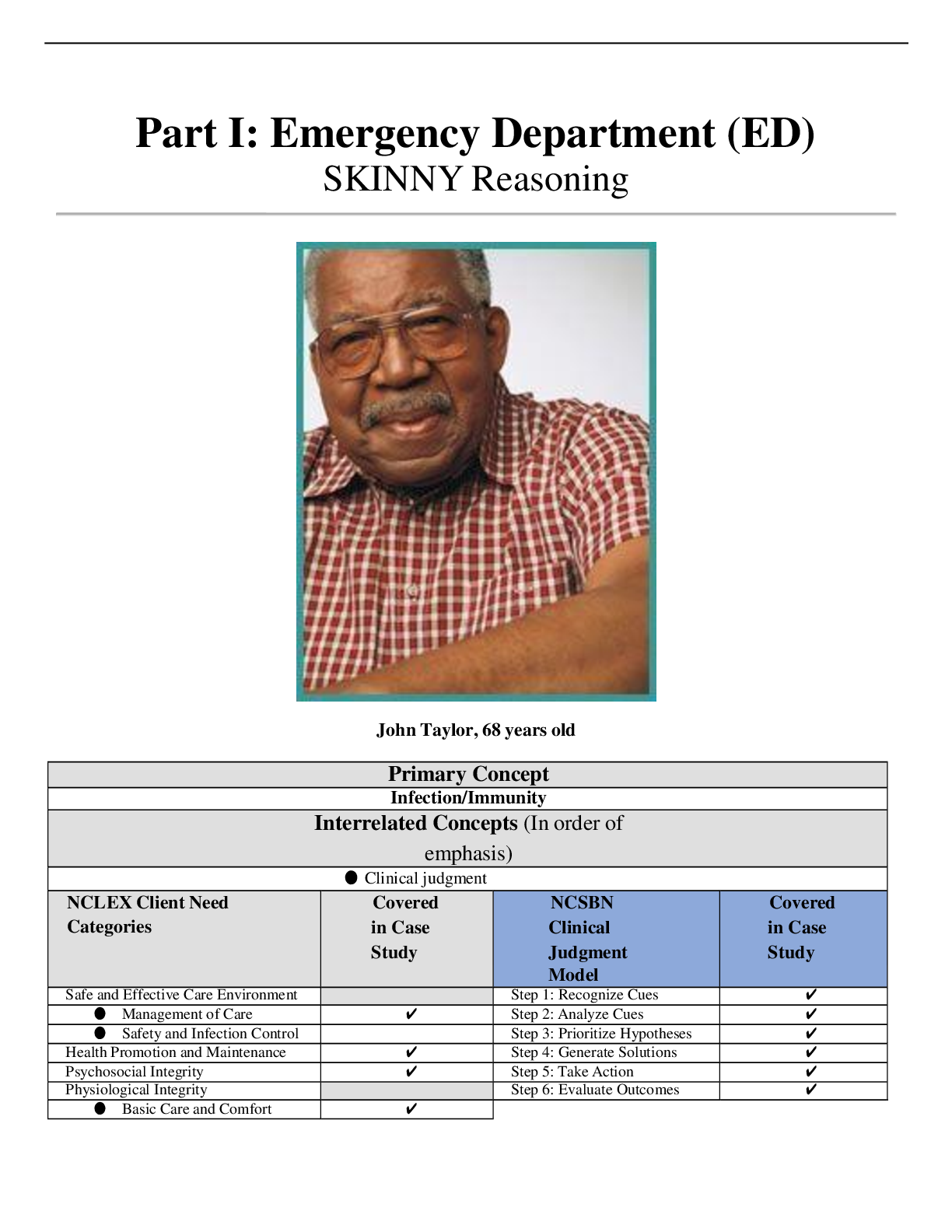*NURSING > QUESTIONS & ANSWERS > South University, Savannah NSG 6320 AGNP BOARD EXAM QUESTIONS Psychiatry Assessment Already Passed (All)
South University, Savannah NSG 6320 AGNP BOARD EXAM QUESTIONS Psychiatry Assessment Already Passed
Document Content and Description Below
AGNP BOARD EXAM QUESTIONS Psychiatry Assessment (40 Questions) Question: A 48-year-old woman states that she began smoking about 10 cigarettes per day at 20 years of age. How should this subjective... history be documented? 10 pack year history 14 pack year history Correct 18 pack year history 20 pack year history Explanation: The pack year history is calculated by the number of pack years = (number of cigarettes smoked per day/20, the number of cigarettes in a pack) × number of years smoked. This patient smokes 10 cigarettes per day / 20 x 28 years smoked = 14 pack year history. Question: An example of an alcohol assessment screening tool is the: Kessler 6. PHQ-9. CAGE. Correct A-SSRS. Explanation: The CAGE Assessment is a quick questionnaire to help determine if an alcohol assessment is needed. If a person answers yes to two or more questions, a complete assessment is advised. The Kessler 6 & Kessler 10 are mental health screening tools used with a general adult population. Patient Health Questionnaire (PHQ-9) is the most common screening tool to identify depression. The Columbia-Suicide Severity Rating Scale (C-SSRS) is a questionnaire used for suicide assessment. Question: A seven- year -old is suspected of having conduct disorder. Which one of the following topics should the nurse practitioner include in the assessment history? Stuttering Animal abuse Correct Worrying excessively about mother Refusing to perform chores Explanation: Animal abuse is often seen in children who display conduct disorder behaviors and would be a topic of concern if the child was abusing animals. Stuttering, worrying excessively about mother, and refusing to perform chores fall into other behavioral disorders. Question: The personality disorder characterized by patterns of attention-seeking, often dramatic behavior to gain the approval of others is: histrionic. Correct antisocial. borderline. narcissistic. Explanation: Histrionic personality disorder is a diagnosis assigned to patients who display patterns of attention-seeking, often dramatic behavior to gain the approval of others. Characteristics of histrionic personality disorder include: over-the-top behavior, such as emotional outbursts, noisy displays of temper, compulsive attention seeking and selfcentered actions. Antisocial personality disorder is a diagnosis given to patients who habitually and pervasively disregard or violate the rights and considerations of others without remorse. Borderline personality disorder is defined as a pervasive pattern of instability with interpersonal relationships, self-image, and affect, and marked impulsivity. Question: What is the leading cause of serious injury among U.S. women of reproductive age? Alcohol and illicit drug use Motor vehicle accidents Suicide Intimate partner and domestic violence Correct Explanation: Intimate partner and domestic violence is the leading cause of serious injury and the second leading cause of death among U.S. women of reproductive age. The U.S. Preventive Services Task Force recommends routine screening of all women of childbearing age for intimate partner violence and referring those who screen positive to intervention services. Question: Which of the following statements made by a parent would alert the nurse practitioner to suspect autism spectrum disorder? He is negative, disobedient and defiant. He acts very impulsively and speaks out of turn. He seems to be speaking less and less. Correct He can't sit still for a short story. Explanation: Communication difficulties are common in the child with autism spectrum disorder. They often speak very little or lose language abilities if early interventions are not started that encourage and build language/communication abilities. The other choices are consistent in children with Attention Deficit Hyperactivity Disorder (ADHD). Question: Which mental health disorder is characterized by reoccurring thoughts, feelings, images, and sensations that lead to repetitive behaviors? Major depressive disorder (MDD) Generalized anxiety disorder (GAD) Obsessive-compulsive disorder (OCD) Correct Somatic symptom disorder (SSD) Explanation: Obsessive-compulsive disorder (OCD) is an anxiety disorder that causes unwanted repeated thoughts, feelings, images, and sensations (obsessions) and prompts patients to engage in behaviors or mental acts in response to these thoughts or obsessions. Major depressive disorder (MDD) is characterized by an overwhelming feeling of sadness, isolation, and despair lasting 2 weeks or longer. Generalized anxiety disorder (GAD) is characterized by persistent and excessive worry about a number of different things. People with generalized anxiety disorder (GAD) may anticipate disaster and may be overly concerned about money, health, family, work, or other issues. Patients with GAD find it difficult to control their worry. Somatic symptom disorder (SSD) causes extreme anxiety about physical symptoms such as pain or fatigue. The person has intense thoughts, feelings, and behaviors about the symptoms that interfere with daily life. Question: Physical manifestations of anxiety disorder would include all of the following except: increased blood pressure. increased heart rate. dilated pupils. drowsiness. Correct Explanation: Anxiety is defined as a state of apprehension, dread, uneasiness, or fear of the unknown. The blood pressure, heat and respiratory rates are usually elevated. The pupils may be dilated and there can be urinary frequency. Question: Social phobia, panic disorder, and post-traumatic stress disorder (PTSD) are all examples of: major depressive disorder (MDD). generalized anxiety disorder (GAD). Correct obsessive-compulsive disorder (OCD). seasonal affective disorder (SAD). Explanation: Social phobia, panic disorder, post-traumatic stress disorder, and acute stress disorder are all examples of generalized anxiety disorder (GAD). Depression disorders include: major depressive disorder (MDD), persistent depressive disorder, bipolar disorder, seasonal affective disorder (SAD), psychotic depression, peripartum (postpartum) depression, premenstrual dysphoric disorder (PMDD), and situational depression. Examples of obsessive-compulsive disorder (OCD) are checking, hoarding, ruminations, and intrusive thoughts. Question: A multifactorial geriatric condition or syndrome characterized by an age-related lack of adaptive physiological capacity occurring in the absence of identifiable illness is known as: delirium. cognitive impairment. functional impairment. frailty. Correct Explanation: A multifactorial geriatric condition or syndrome characterized by an age-related lack of adaptive physiological capacity occurring in the absence of identifiable illness is known as frailty. Delirium is a serious disturbance in a person's mental abilities that results in a decreased awareness of one's environment and confused thinking. In the older adult, it is defined as a geriatric syndrome or condition occurring as a temporary state of confusion and may be the first clue to infection or problems with medications. Cognitive impairment is an intermediate stage between the expected cognitive decline of normal aging and the more serious decline of dementia. Functional impairment is a health condition in which the normal function of a part of the body is less than full capacity. One of the defining characteristics of functional impairment is that the reduction in physical or mental capacity is sufficient to interfere with managing day-to-day tasks. Question: A 65-year-old man presents with complaints of daytime sleepiness, unrestful sleep, and loud snoring. These symptoms are MOST consistent with: narcolepsy. nocturnal asthma. obstructive sleep apnea (OSA). Correct chronic obstructive pulmonary disease (COPD). Explanation: OSA complaints include daytime sleepiness, unrestful sleep, and loud snoring. Narcolepsy presents with symptoms of cataplexy, sleep paralysis, hypnogogic hallucinations, and excessive daytime sleepiness. Nocturnal asthma symptoms include chest tightness, shortness of breath, cough and wheezing. Signs of COPD include nighttime wheezing, coughing, and chest tightness, and morning phlegm and cough. Question: The Clinical Institute Withdrawal Assessment for Alcohol Withdrawal (CIWA) recommends inpatient management for scores higher than: 2 4 6 8 Correct Explanation: The Clinical Institute Withdrawal Assessment for Alcohol Withdrawal (CIWA) can be incorporated into the usual clinical care of patients undergoing alcohol withdrawal and into clinical drug trials of alcohol withdrawal. Scores of 7 or less do not require inpatient admission, but outpatient treatment is recommended. A score greater than 8 requires inpatient admission and medication management. Question: Anticipatory guidance for the family of a pre-adolescent with a cognitive impairment should include information about: institutional placement. sexual development. Correct environmental stimulation. self-care activities. Explanation: Pre-adolescents who have a cognitive dysfunction may have normal sexual development without age appropriate emotional and cognitive abilities. It is important to assist the family and child through this developmental stage. Pre-adolescence does not require the child to be institutionalized. By the time a child reaches pre-adolescence, the family should have received instructions on ways to encourage and reinforce selfcare activities and strategies to enhance the environment to encourage growth and development. Question: Extreme anxiety about physical symptoms (i.e., pain or fatigue) that causes intense thoughts and behaviors that interfere with daily life is classified as: major depressive disorder (MDD). generalized anxiety disorder (GAD). obsessive-compulsive disorder (OCD). somatic symptom disorder(SSD). Correct Explanation: Somatic symptom disorder (SSD) occurs when a person feels extreme anxiety about physical symptoms such as pain or fatigue. The person has intense thoughts, feelings, and behaviors related to the symptoms that interfere with daily life. Major depressive disorder (MDD) is characterized by an overwhelming feeling of sadness, isolation, and despair that lasts two weeks or longer at a time. Generalized Anxiety Disorder (GAD) is characterized by persistent and excessive worry about a number of different things. People with generalized anxiety disorder (GAD) may anticipate disaster and may be overly concerned about money, health, family, work, or other issues. Patients with GAD find it difficult to control their worry. Obsessive-compulsive disorder (OCD) is an anxiety disorder in which people have unwanted and repeated thoughts, feelings, images, and sensations (obsessions) and engage in behaviors or mental acts in response to these thoughts or obsessions. Question: Which of the following is NOT a symptom associated with the formal diagnosis of attention-deficit hyperactivity disorder (ADHD) in a child? Difficulty organizing tasks and activities Inability to play or engage in leisure activities quietly [Show More]
Last updated: 1 year ago
Preview 1 out of 14 pages
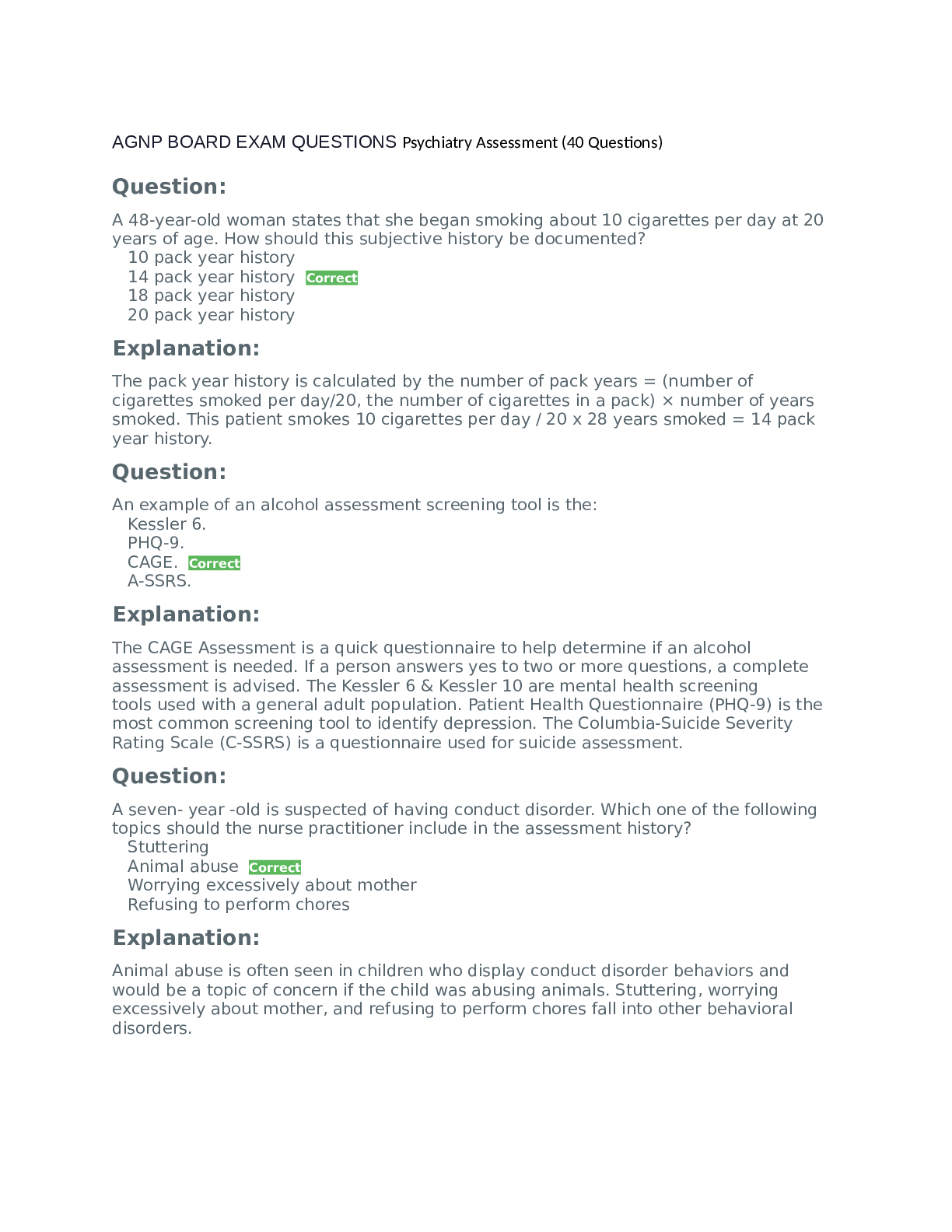
Reviews( 0 )
Document information
Connected school, study & course
About the document
Uploaded On
Apr 22, 2022
Number of pages
14
Written in
Additional information
This document has been written for:
Uploaded
Apr 22, 2022
Downloads
0
Views
69

.png)
.png)
.png)
.png)
.png)
.png)
